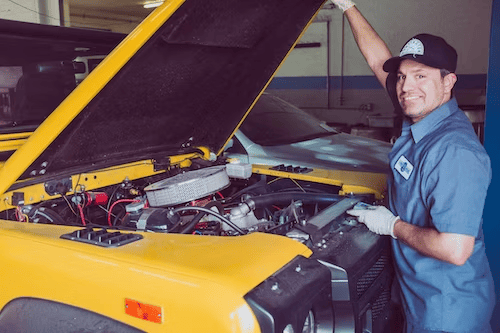Finding a reliable second-hand car dealer can feel like a daunting task. With so many dealerships and individual sellers, it’s crucial to know how to navigate this landscape to ensure you get the best deal and a vehicle that suits your needs. Knowing that your new car will provide years of continued service can give you peace of mind when done correctly. On the other hand, choosing an unreliable dealer could result in costly repairs or, even worse – purchasing a lemon. This guide aims to equip you with the knowledge and tools to find and choose a reputable pre-owned car dealer, turning a stressful process into a smooth and satisfactory experience.
1. Research the Used Car Dealer’s Reputation and Reliability
In the digital age, the Internet is invaluable when researching a used car dealer’s reputation. Check online reviews and ratings on platforms like Google, Yelp, or the Better Business Bureau. These platforms provide firsthand accounts from previous customers detailing their experiences with the dealership. Keep an eye out for recurring themes within these reviews, such as exceptional customer service, fair pricing, or, conversely, patterns of dishonesty or poor service. Remember, while no business is immune to occasional negative feedback, a pattern of poor reviews should serve as a red flag.
After examining online reviews, peruse the dealer’s website and social media platforms. These channels can provide insight into the dealership’s level of professionalism and its engagement with customers. Look for information about their history, ethos, and the standards they adhere to. Working with a trusted second hand car dealer means you can purchase with greater peace of mind and confidence. Dealerships that have been in business for many years and have developed a good reputation within their community are generally more reliable. In contrast, dealerships with a history of legal issues or frequent customer complaints should be approached cautiously.
2. Check for Certifications, Awards, or Accreditations
Ensuring that the dealership holds the necessary certifications, awards, or accreditations is essential when scouting for a reliable used car dealer. Certifications from auto manufacturers or independent entities like the National Independent Automobile Dealers Association (NIADA) in the US signal that the dealership complies with industry standards and best practices. They indicate the dealer’s commitment to providing high-quality vehicles and achieving customer satisfaction. For instance, dealers certified by auto manufacturers have proven their ability to meet or exceed the manufacturer’s rigorous standards for vehicle quality, safety, and performance.
Moreover, awards or recognitions from renowned industry organizations or community forums highlight a dealer’s excellence in various aspects of the business. These include customer service, ethical business conduct, community involvement, and environmental sustainability efforts. Such awards signify the dealer’s commitment to prioritizing customer needs and adhering to industry standards. Accreditations, however, often indicate that the dealership complies with particular industry regulations, demonstrating its legitimacy and commitment to transparency and integrity.
3. Meet the Dealer and Inspect the Vehicle In Person
Once you have evaluated the dealer’s online presence, meeting them in person and inspecting the vehicle is essential. This will give you the chance to ask questions and get a feel for how reliable they are. During this meeting, observe their behavior; Are they attentive and willing to answer all of your questions? Are they knowledgeable and confident in their responses? These are all indicators of the quality of service you can expect from them.
Inspecting the vehicle is also essential before making a purchase. Check that it is in good condition visually, inside and out, with no signs of damage or excessive wear and tear. Take it for a test drive to better understand its performance. If you need clarification on the condition or performance of the car, ask a trusted mechanic to inspect it for you before purchase.
4. Have a Third Person Inspect the Vehicle
One way to ensure you’re making a wise decision is to have a third person inspect the vehicle before purchasing it. Even if you consider yourself a car expert, another set of eyes can catch issues or potential problems that you might miss. This could be an experienced mechanic or body shop technician who can accurately assess the condition and performance of the car.
Having a reputable third person inspect the vehicle provides added peace of mind that the car is, in fact, in good condition and fit for purpose. Plus, an inspector can provide an unbiased opinion that can be invaluable when negotiating the price. Don’t let your excitement about a new car blind you to potential issues. Take the time to hire an unbiased third party to inspect the vehicle and make an informed decision about your purchase.
5. Compare Prices Carefully
When shopping for a used car, it’s important to compare prices carefully, as buying a used car can often result in significant savings. In addition to the price of the vehicle itself, factor in costs such as registration and taxes, plus any additional fees or charges. Compare these figures across different dealerships or private sellers to estimate the total cost accurately. Additionally, consider any additional costs, such as insurance and upkeep, that may arise after purchase.
It’s also important to remember that the cheapest option is sometimes the best choice. While a lower price may be appealing initially, it often comes with hidden problems or issues that can cost you more in the long run. Therefore, carefully weigh the price tag of a used car against its condition and performance.
6. Consider Used Car Financing Options
Another factor to consider when buying a used car is financing options. Various used car financing options are available, from traditional bank loans to specialized auto financing. Determine what type of loan is best for your budget and credit score before making a purchase. Research the different lenders available and compare their interest rates and other terms before deciding which one best suits your needs.
Also, with certain types of financing, such as lease-to-own programs, you may be able to purchase the vehicle at a lower cost than traditional financing. Consider your options carefully and choose the one that fits your budget and lifestyle best. Once you’ve chosen the right loan option, ensure all the paperwork is in order before closing the deal. Everything in writing will protect your interests and ensure everything goes smoothly.
7. Look for Special Offers and Discounts
As a potential used car buyer, watching for special offers and discounts is worthwhile. Dealerships often have promotions that can significantly reduce the cost of your purchase, such as seasonal sales, end-of-financial-year deals, or discounts on specific models. These offers can reduce the initial purchase price, making your desired vehicle more affordable. Following the dealership on social media or subscribing to their newsletter is advisable to stay abreast of these promotions.
Moreover, negotiate with the dealer to get the best possible price. Be bold and ask for a discount, as many dealers expect some negotiation and price haggling. If you have done your research and have a good idea of what the car is worth, you can negotiate a fair price. Remember to also inquire about additional incentives such as extended warranties, complimentary services, or upgrades, as these can add value to your purchase.
Buying a used car can be daunting, but with the right research and preparation, it is possible to find a reliable dealer and a quality vehicle. Take your time to evaluate the dealership’s services, meet them in person, and inspect the car thoroughly before committing to purchase. With these tips, you’ll be well on your way to finding a reliable second-hand car dealer who can provide the perfect vehicle for your needs.


